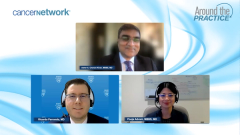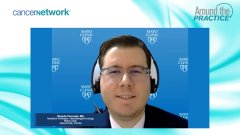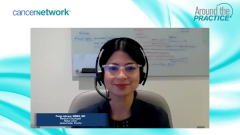
Firstline BTKi Monotherapy in Patients With CLL: 4-Year Follow-Up Data from SEQUOIA
SEQUOIA trial data show significant benefits in progression-free survival for patients with chronic lymphocytic leukemia treated with single-agent zanubrutinib, even without a high-risk 17P mutation; Pooja Advani, MD, MBBS, notes that second-generation BTK inhibitors show lower rates of atrial fibrillation and flutter compared with first-generation ones, suggesting increased cardiac safety.
Asher A. Chanan-Khan, MD, MBBS: I think it would be worth informing the audience of 2 important trials.... One is the [phase 3] SEQUOIA trial [NCT03336333]. The most updated data were presented by Dr [Mazyar] Shadman, from Fred Hutchinson Cancer Center in Seattle, Washington. The SEQUOIA trial, just to refresh your memory, was a very interesting trial, focusing on those patients who are not high risk. Arms A and B basically looked at zanubrutinib given orally twice a day vs bendamustine and rituximab [BR]. So this was single-agent zanubrutinib vs the BR chemotherapy if this was in a treatment-naïve patient. Dr Shadman reported on the non–high risk or non–deletion 17p patients, which is a very common population, mostly seen in the community practice. [Although] the progression-free survival [PFS] was not reached for zanubrutinib, it was [approximately] 42 months for BR. The estimated PFS was actually 2% for zanubrutinib. So we’re talking about 4 years with a single agent and very well-controlled disease, which is pretty significant.... This benefit that they reported was independent of whether IGVH mutation was there or not, even in patients with 11Q. There was a significant benefit in response rates, CRs [complete remissions], and so forth. Patients who were without 17p were 17% and 22% in terms of CR [complete remission] and CRi [CR with incomplete blood count recovery]. The median overall survival was not reached in either arm, but the estimated 42-month rates were 89% and 88%. So these trials haven’t shown overall survival benefit. But if you look at them, PFS was significantly better. There was a separate cohort of patients with high-risk 17p deletion.... These [patients] were assigned again to zanubrutinib monotherapy. After a median follow-up, I think of 47 months or so, the estimated 42-month PFS was 79% vs 90%. This trial did show atrial fibrillation and flutter in [approximately] 5% of the patients. Dr Advani, would you like to comment? Is that something out of the norm that we should worry about? We will dive into more about it later, but do you have a short comment about it?
Pooja Advani, MD, MBBS: When we think about atrial fibrillation and flutter, where we start sort of historically is with the first-generation BTK inhibitor ibrutinib. The rate of atrial fibrillation and flutter was relatively high, 10% to 17%. But grade 3 or higher events were 2% to 9%. By comparison, when we think about a second-generation irreversible BTK inhibitor [we think of] acalabrutinib and zanubrutinib. Thankfully, the [cases of] all-grade atrial fibrillation and flutter that have been reported not only in clinical trials but also in real-world experiences have been 3% to 4%. More importantly, the grade 3 or higher events have been less than 2%, closer to 1%, 1.5%. So I think we’re certainly seeing that the second-generation BTK inhibitors are relatively safer when it comes to atrial fibrillation and flutter. When we think about hypertension overall, the grades are quite similar between ibrutinib, acalabrutinib, and zanubrutinib. And the rate of ventricular arrhythmias is thankfully again, very, very low with all of these agents.
Asher A. Chanan-Khan, MD, MBBS: Thank you for that. Dr Parrondo mentioned earlier the acalabrutinib and zanubrutinib combination, and Dr Advani pointed out that the second-generation BTK inhibitors [appear to be] much more safe from a cardiotoxicity perspective.
Newsletter
Stay up to date on recent advances in the multidisciplinary approach to cancer.








































